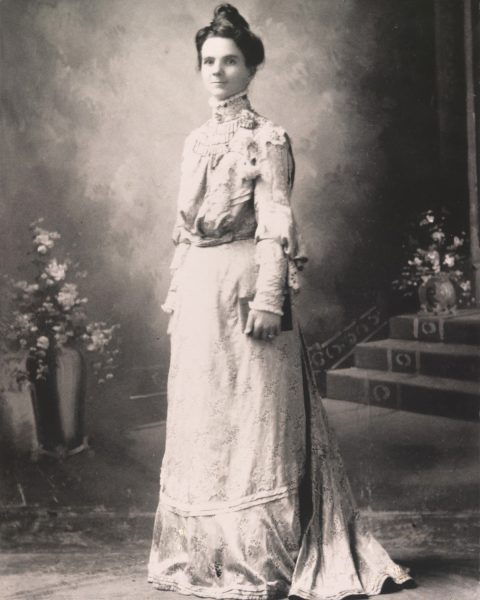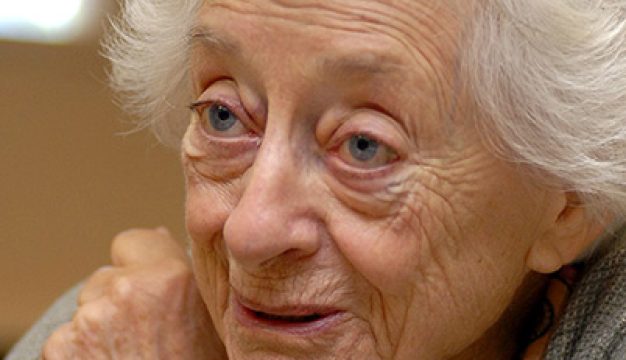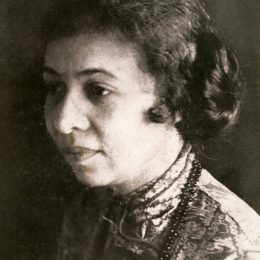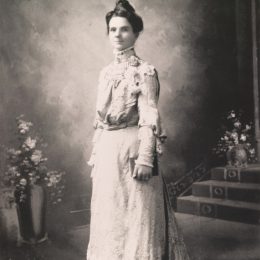Adella Hunt Logan
Tuskegee Institute faculty member Adella Susan Hunt Logan (1863–1915) contributed greatly to feminist intellectual thought during the first decades of the twentieth century on the controversial topic of universal women's suffrage. Through her writings and lectures at the local, regional, and national levels, and her involvement in founding the Tuskegee Women's Club, Logan became one of the most ardent champions in Alabama for the passage of national legislation to give women the legal right to vote.
The timing of her birth and her privileged social status placed Logan squarely within a distinct generation of educated African American women who advocated fervently for reform post-Reconstruction. The 1896 landmark Supreme Court case Plessy vs. Ferguson, which legalized racial segregation and prompted the widespread implementation of Jim Crow segregation laws, propelled Logan and her contemporaries into activism. A dismal period of anti-Black sentiment in mainstream society followed the ruling, causing a sweeping reversal of social, economic, and political gains for African Americans attained during Reconstruction. Reversals took place in Alabama when legislators ratified the state's 1901 Constitution to overturn provisions enacted by Alabama's 1868 Reconstruction Constitution, including protections for Black citizens and Black men's access to the vote and political office. Such setbacks prompted Logan to join the suffragist movement and to address the educational, healthcare, and every day needs of impoverished rural women and families through her writings, lectures, and outreach. Logan also mentored Tuskegee Institute students and trained African American educators and became a recognized authority in the South on effective methods for teaching African American children.
Logan was freeborn on February 10, 1863, in Sparta, Georgia, to Henry Alexander Hunt, a white farmer, and Mariah Lilly Hunt (aka Cherokee Mariah Lilly), a free woman. Henry Hunt was a veteran of the Confederate States Army. Mariah Hunt was of African and Cherokee descent. The Hunts had eight children together, including Adella who looked like a white person but identified as Black. Henry Hunt did not reside with his family, but he supported them financially and helped pay his children's tuition at the Bass Academy, an all-Black school in Sparta established by the Freedmen's Bureau.
At age 16, Adella Hunt acquired a tuition-free scholarship to attend the historically Black Atlanta University (present-day Clark Atlanta University). She began a two-year program of study in 1879 and graduated in 1881. She taught at an American Missionary Association school in Albany, Georgia, for two years, then joined the faculty at Tuskegee Normal and Industrial Institute in 1883. Her only female faculty colleagues at the time included Olivia A. Davidson and Fannie (Fanny) Smith. Hunt taught English and social sciences, was the school's first librarian, and briefly was "Lady Principal," overseeing teacher training. She married Warren Logan on December 27, 1888, in Fulton County, Georgia. He had befriended Washington while studying at Hampton Institute in Virginia and would become Tuskegee Institute's treasurer and a civic leader in his own right. The couple had nine children, though only six lived to adulthood. In 1901, Adella Logan returned to Atlanta University and completed graduate coursework for a master's degree. Though she earned a master's, Atlanta University could only confer an "honorary" degree to Logan because it lacked accreditation to award earned master's degrees.
Logan became close friends with Tuskegee Institute president Booker T. Washington and with W. E. B. Dubois, a co-founder of the National Association for the Advancement of Colored People (NAACP) through interactions within their prominent circle of Black educators. Both men admired Logan's professionalism and demeanor. Logan corresponded often with Dubois. In a letter she wrote to him dated October 10, 1904, Logan commended his prose poem entitled "Credo" published on October 6, 1904. in the journal The Independent. The poem expressed Dubois’s respect for the Black race and his belief in racial equality. Logan asked Dubois to send copies of "Credo" printed on special display cards to her so she could give them to others as a keepsake.
Logan, along with Margaret Murray Washington, a Tuskegee administrator and the third wife of Booker T. Washington, and other women organized the Tuskegee Women’s Club (TWC) in 1895. They too became friends and together executed the TWC's mission to uplift local rural women and their families, and to promote women's suffrage, especially for Black women. Logan steered TWC members to include women's suffrage on the meeting agenda regularly. She led robust monthly group discussions and special "suffrage night" meetings to stimulate deeper discourse on the topic among club members and students. Coincidentally, Washington and Logan were close in age: Washington was born in Macon, Georgia, near Sparta, Logan's hometown, and Washington was Logan's "Lady Principal" successor at Tuskegee. Logan's proteges included her junior colleague and fellow TWC member, Bess Bolden Walcott. Influenced by Logan, Walcott became one of the first women to vote in Tuskegee after women eventually gained the legal right to vote.
Though Logan identified as Black, she sometimes passed for white to attend all-white National Women’s Suffrage Association (NAWSA) conventions. The NAWSA formed in 1890, when the National Woman Suffrage Association, founded by celebrated suffragists Susan B. Anthony and Elizabeth Cady Stanton, merged with the American Woman Suffrage Association. NAWSA leaders were still angered by passage of the Fifteenth Amendment, which gave Black men the legal right to vote but not white women, and so they pivoted from promoting universal suffrage to suffrage just for white women. They wanted southern white politicians and voters to support legislation in favor of the vote for white women, so they adopted Jim Crow segregation practices such as banning African Americans from conventions. Despite this, Logan came to admire Anthony after hearing one of her speeches. Ironically, Anthony refused to let Logan speak at the 1897 NAWSA convention because of her race. Regardless, Logan became a follower of Anthony's suffragist ideology and a lifetime NAWSA member. Using pseudonyms to shield her racial identity, Logan wrote for The Women's Journal, a NAWSA newspaper. In so doing, she promoted her ideals to a national audience.
Though many African Americans despised the tactic of some Blacks to pass for white, attending NAWSA conventions as a white woman afforded Logan opportunities to stay abreast of movement developments and share them with African American colleagues. These included leaders who had formed the National Association of Colored Women (NACW) in 1896 at the first annual convention of the National Federation of Afro-American Women in America. The National Federation merged with the Women's Era Club of Boston, the Colored Women's League of Washington, D.C., and other clubs to form the NACW in direct response to exclusion by NAWSA and other white women's organizations and clubs. The NACW later became the National Association of Colored Women's Clubs (NACWC). The TWC's mission of uplift mirrored that of the NACWC, and they soon became affiliated. Both organizations performed outreach among Black women of all social classes to acknowledge their shared experiences of the doubly harsh oppression resulting from being both Black and female, a condition of double oppression contemporary scholars refer to as "intersectionality."
Logan headed the NACWC's suffrage department and lectured at its regional and national conferences, promoting ideals of equality for all. In her essay published in The Colored American Magazine's 1905 issue, Logan noted that if white women who enjoyed protections related to their gender and race deserved voting rights, how much more then did unprotected Black people deserve the vote to ensure their access to liberty, as outlined by the Declaration of Independence? Logan raised a similar argument in another essay published in the September 1912 edition of the NAACP journal The Crisis: A Record of the Darker Races, which editor W. E. B. DuBois devoted entirely to women's suffrage. The essay, entitled "Colored Women as Voters," argued that Black mothers cared deeply about educating their children but could not contribute their ideas about securing adequate public school funding because they were denied access to the political process. Logan simultaneously called for voting rights, but she also described Black women as responsible mothers and thinking citizens, refuting entrenched stereotypes that portrayed them negatively.
In 1915, troubling events occurred in Logan's personal life that took a toll on her mental health. Rumors surfaced of her husband's extramarital affair, and Logan had an emotional breakdown. She sought treatment at a sanitarium in Michigan in September 1915. After losing dear friend Booker T. Washington, who died that November, Logan died by suicide on December 15, 1915, by jumping from a Tuskegee Institute campus building. She was buried in the campus cemetery. Four years later in 1919, Congress passed the Nineteenth Amendment to the U.S. Constitution, which established women's legal right to vote.
Throughout her professional life, Adella Hunt Logan forged a legacy of feminist intellectual thought and high-profile advocacy for African American education, family health and well-being, and women’s suffrage. Though she died before the Nineteenth Amendment was ratified in 1920, she no doubt facilitated passage of this landmark legislation through her dedication and widespread influence on behalf of women's suffrage.
Further Reading
- Bailey, Richard. They Too Call Alabama Home: African American Profiles 1800-1999. Montgomery, Ala.: Pyramid Publishing, Inc., 1999.
- Cott, Nancy F. The Grounding of Modern Feminism. New Haven, Conn.: Yale University Press, 1987.
- Alexander, Adele Logan. "Adella Hunt Logan and the Tuskegee Women's Club: Building a Foundation for Suffrage." In Stepping Out of the Shadows: Alabama Women 1819-1990, edited by Martha Mary Thomas, pp. 96-113. Tuscaloosa: University of Alabama Press, 1998.
- Logan, Adella Hunt. "Women's suffrage." The Colored American Magazine. September 1905, 487-89.
- ———. "Colored Women as Voters." The Crisis: A Record of the Darker Races.
- Logan, Shirley Wilson. We Are Coming: The Persuasive Discourse of Nineteenth-Century Black Women. Carbondale: Southern Illinois University Press, 1999.
- Smith, Terrance D., and Sally J. Zepeda. "Adella Hunt Logan, 1863-1915." In The Varieties of Women’s Experiences: Portraits of Southern Women in the Post-Civil War Century, edited by Larry Eugene Rivers and Canter Brown Jr., 151-170. Gainesville: University of Florida Press, 2009.
- Terborg-Penn, Rosalyn. African American Women in the Struggle for the Vote, 1850-1920. Bloomington: Indiana University Press, 1988.








